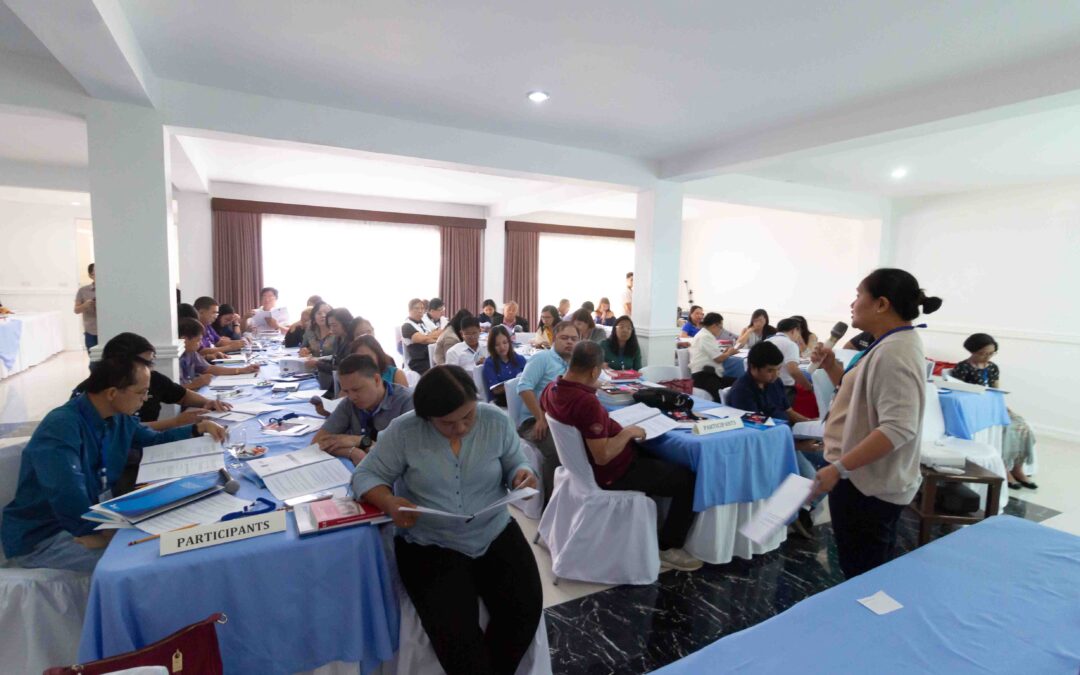
May 26, 2018 | News
Today, the ICJ and the Integrated Bar of the Philippines (IBP) concluded a two-day workshop on eliminating gender discriminatory attitudes and behaviours towards women with a commitment to step up efforts on the protection of rights of women in the country.
Participants at the workshop were lawyers from IBP’s legal aid committees from the Eastern and Western Visayas Regions.
The workshop was held in Bohol from 25 to 26 May 2018.
“Legal aid providers are at the frontline of assisting women in accessing justice,” said Frederick Rawski, ICJ’s Regional Director for Asia and the Pacific.
“It is critical that they are able to immediately detect discriminatory conduct against the women they are assisting and help in eliminating such discrimination,” he added.
Recourse to gender stereotypes in the administration of justice widespread in the Philippines and they impact women’s access to justice.
Participants at the workshop noted, in this respect, examples such as the belief that women, unlike men, are weak in the physical and cognitive sense, and the ‘virtuous-or-good-woman-versus-bad-woman-or slut’ stereotype that are still reflected in law and court decisions in Philippines.
It was noted that the UN Committee on the Elimination of Discrimination against Women had emphasized that “stereotyping and gender bias in the justice system have far-reaching consequences for women’s full enjoyment of their human rights.”
The discussions during the two-day workshop also focused on strengthening the capacity of legal aid providers to further enhance access to justice of women whose loved ones and relatives had been extra-judicially killed.
Atty. Abdiel Dan Fajardo, National President of the IBP addressed the ongoing extrajudicial killings and culture of impunity in the Philippines that affects women particularly.
He said: “Without combatting the culture of impunity, legal aid lawyers cannot enhance access to justice for women. Therefore, it is high time to bolster the knowledge and awareness of legal aid lawyers in combatting impunity that affect women and their children.”
It was recalled that the remarks of the UN Special Rapporteur on extrajudicial, summary, or arbitrary executions, Agnes Callamard, in her report to the Human Rights Council in 2017, stressed that women are particularly affected by the extrajudicial killing of their partners and other family members.
The Special Rapporteur noted that in the Philippines, since majority of the victims are men, their female partners, “by virtue of their gender-based roles, are left to confront the associated stigma, fear, insecurity and economic deprivation, in addition to the burdens of identifying and burying their dead loved ones and seeking justice.”
At the Bohol workshop, ICJ and IBP also signed a Memorandum of Agreement to commence joint work on strengthening the IBP’s National Center for Legal Aid (NCLA).
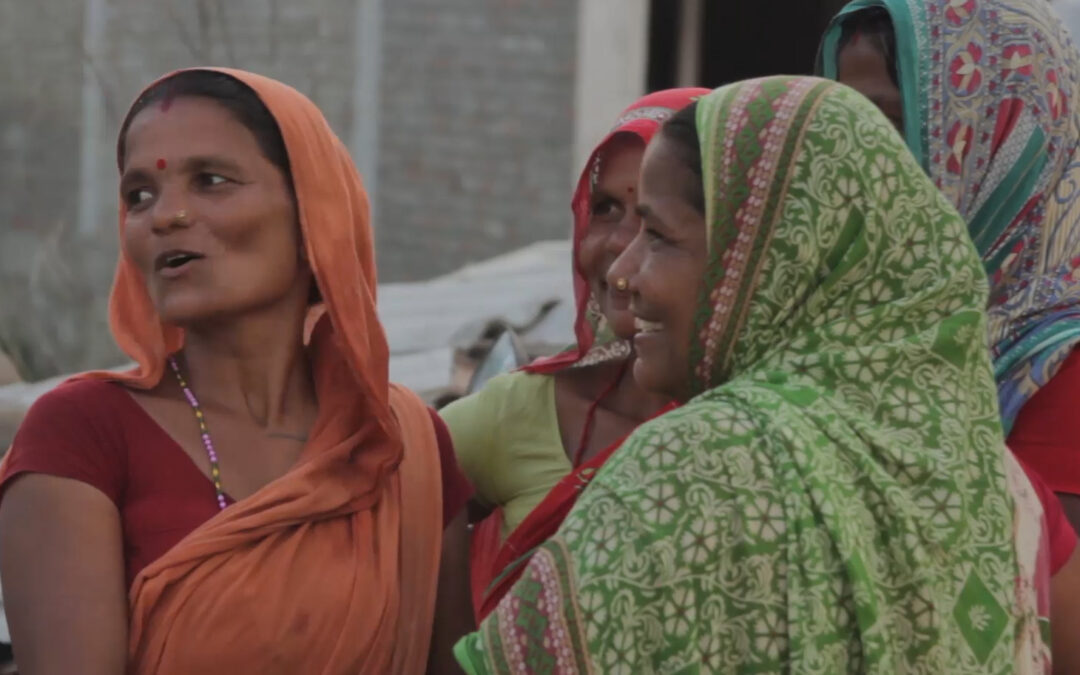
Apr 13, 2018 | Multimedia items, News, Video clips
In 2017, Nepal held its first local-level elections for almost 20 years and the first ever conducted under the new federal state structure established under the 2015 Constitution. They were significant because of the unprecedented number of women who stood as candidates and won.
Women in Nepal have experienced systemic discrimination for decades, especially those in rural areas, among ethnic minorities and marginalized groups.
These elections presented the women of Nepal with the opportunity to break through barriers that have prevented them for decades from participating in political and public life.
The Local Level Governance Act lays out the mandate and functions of newly formed local bodies.
If the recently elected women are allowed to meaningfully participate in local governance, the new law could empower them further so that they can take the lead in addressing key human rights issues, especially the human rights of women.
This video documents the campaign of Rikam BK, a Nepalese politician, belonging to the Communist party of Nepal-Maoist (CPN-M).
In the Nepal Legislative Election held on 26 November 2017, she was elected as a Sub-Mayor (NCP Maoist) of Lahan Municipal Council winning 5000 votes.
She is the chairperson of the Dalit Preservation Abhiyan Forum, in Siraha. She has been advocating the issue of land certificates in the names of both husband and wife.
She continues to call for those deprived of land rights to have equal access to land. She is also the member of National Alliance for Women Human Rights Defenders (NAWHRD).
Many of the women featured in this video are women human rights defenders who have been working to promote and protect human rights in Nepal for decades.
Many of them participated in the Regional Conference on Women Human Rights Defenders as Political Actors, which was organized by the ICJ, with the cooperation of NAWHRD.
The conference was held from 28 to 29 August 2017 in Kathmandu.
The ICJ recently released a briefing paper laying out the key points of the conference and offering a set of future actions aimed at supporting WHRDs in their role as political actors pursuing a human rights agenda.
Watch the video
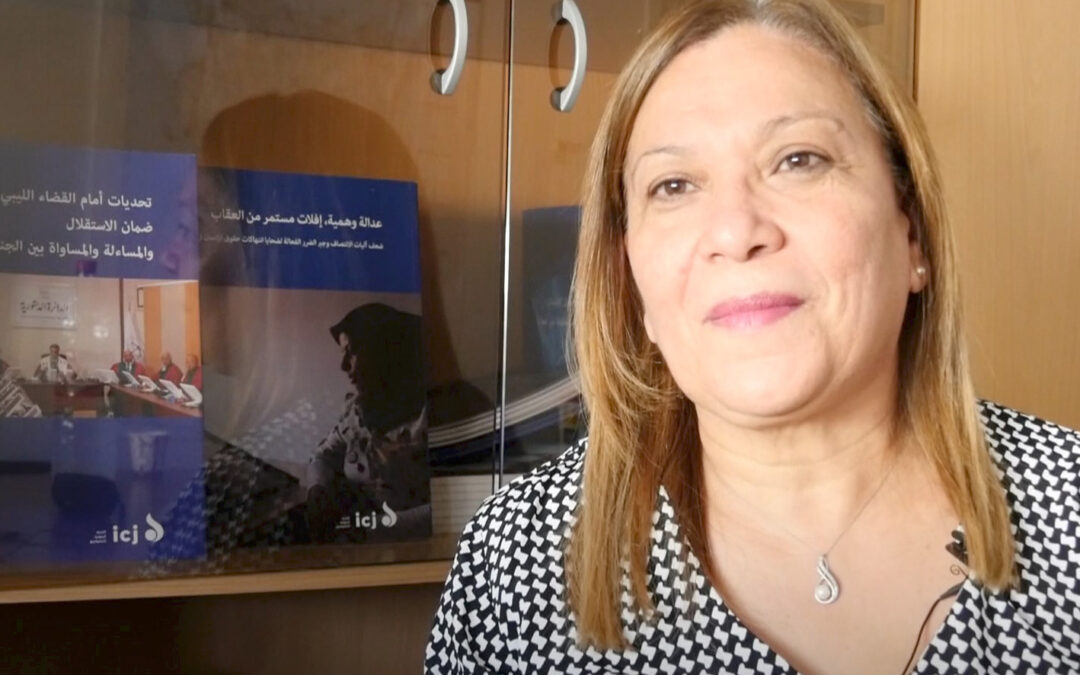
Nov 2, 2017 | Multimedia items, News, Video clips
The ICJ ends its series of profiles of its women Commissioners with an interview with Judge Kalthoum Kennou is currently serving her second term as ICJ Commissioner.
Kalthoum Kennou is a Judge of the Tunisian Cassation Court.
She previously served as an investigating Judge at the Tribunal of Tozeur in Tunisia (2010 – 2012), an investigating Judge at the Tribunal of Kairouan (2005 – 2010) and a Judge at the Court of Appeal of Tunis (2001-2005).
She is a strong advocate of the rule of law and the independence of the judiciary in Tunisia, and for women’s rights.
She was active in opposition to the dictatorship of President Zine el-Abidine Ben Ali.
As a consequence of her work, she was subjected to politically motivated personal attacks including arbitrary transfers to remote parts of the country.
After the political revolution in January 2011, she became President of the Association of Tunisian Judges.
She has worked on the new Tunisian Constitution and was the first female candidate in the November 2014 Presidential elections.
In this interview, Judge Kennou speaks about the reasons that prompted her to take up a legal career.
Her father was wrongly accused of high treason and imprisoned and she wanted to show people that there could be fair judges who worked independently.
On his release, her father also supported her decision to study the law.
She was appointed a judge in 1989 but said that other women had been appointed before her so it was not that difficult.
The main problems were that male judges were reluctant to discuss certain issues in front of her and she had to stand up for herself.
“However what was a bit troublesome was with the police when I gave them instructions and I think they would have preferred it was a man and not a woman. But I stood up for myself and I became an investigating judge and I was there to give orders to the police, to the clerk of court, as a judge and as a woman judge.”
Under the dictatorship of Ben Ali, she explains in the interview that there were a quite an important number of judges who resisted and defended the independence of the judiciary.
“… I think our resistance had some results. The proof was that just after the revolution, the question of the independence of the judiciary became a demand of the people, not just the judiciary.”
She explains in the interview that now 43% of the judiciary in Tunisia are women.
This is because there are more women studying law, more women than men, and because the government is promoting women’s equality.
However, many women may take up a legal career without wishing to become a judge.
This is because of family reasons, as they don’t wish to be appointed to a court away from home and in some families, parents might feel that women should be protected from some of the real problems of society.
“But actually I think this kind of thinking is less common now and will disappear bit by bit. Judges have shown that they can have an impact and society accepts female judges more than male judges. They consider that female judges are less corrupt, that they are more serious and are making more efforts to deliver justice.”
The main problems for women in accessing justice in Tunisia are related to pressure from the family not to file complaint in cases of domestic violence.
Also there is a problem with the attitudes of the police who do not take physical aggression against a woman seriously.
The third issue is the mentality of some judges, including some women judges, who are not really convinced that a husband does not have the right to beat his wife.
“The law exists but we should also work on people’s mentalities so that the law is correctly applied.”
Judge Kennou concludes the interview with some advice for young women considering a legal career. She said that a young woman must learn to “stand up for herself and for her rights at home because you cannot be free, you cannot give to others, if your own rights are not realized… I think that a woman who wants to be a judge should be really convinced and well trained about human rights so she can apply the law in a correct manner. “
Watch the interview:
The series of profiles introducing the work of ICJ Commissioners and Honorary Members on women’s rights was launched on 25 November 2016 to coincide with the International Day to Eliminate Violence against Women and the first day of the 16 Days of Activism Against Gender-Based Violence Campaign.
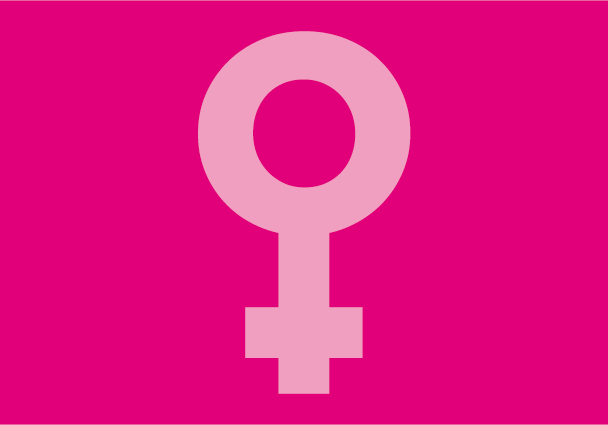
Sep 25, 2017 | Advocacy, Non-legal submissions
The ICJ today joined a group of 285 organisations from around the world calling on governments across the world to respect, protect and fulfill the right to access safe and legal abortion services and post-abortion care.
The statement, which was delivered by the NGO Action Canada for Population and Development, during a general debate at the UN Human Rights Council in Geneva, read as follows:
Through the Vienna Declaration and Programme of Action, States explicitly agreed to prioritize the human rights of women, including the eradication of gender-based discrimination and violence. However, many States have not yet made the important decision that women’s human rights deserve to be upheld and their lives are worth saving. The continued criminalization of abortion and restrictions on access to and provision of abortion and post-abortion care in many jurisdictions is stark evidence of this.
Around 22 million unsafe abortions are estimated to take place around the world annually, leading to 7 million health complications and 47,000 deaths. In addition, there are major social and financial costs to women and girls, families, communities, health systems and economies. The criminalization of abortion and failure to ensure access to quality abortion services is a violation of the rights to non-discrimination, to privacy, and to make decisions about one’s own body, and can constitute torture or ill-treatment, as repeatedly highlighted by UN bodies and experts. Prohibiting abortion pushes it underground and gives rise to unsafe abortions, violating the rights to life, health and bodily autonomy. Moreover, the poor and those already facing multiple and intersecting forms of discrimination are disproportionately affected, making the global community’s pledge to “leave no one behind” ring hollow.
These human rights violations must stop now. On September 28, the Global Day of Action for Access to Safe and Legal Abortion, we urge the Human Rights Council to address the human rights violations arising from criminalization of abortion and the denial of access to safe and legal abortion services through its resolutions, decisions, dialogues, debates, and the UPR. We demand in a collective voice that governments across the world respect, protect and fulfill the right to access safe and legal abortion services and post-abortion care.
The full statement, with the list of signatories, may be downloaded in PDF format here: HRC36-JointOralStatement-item8-GD-Abortion-2017
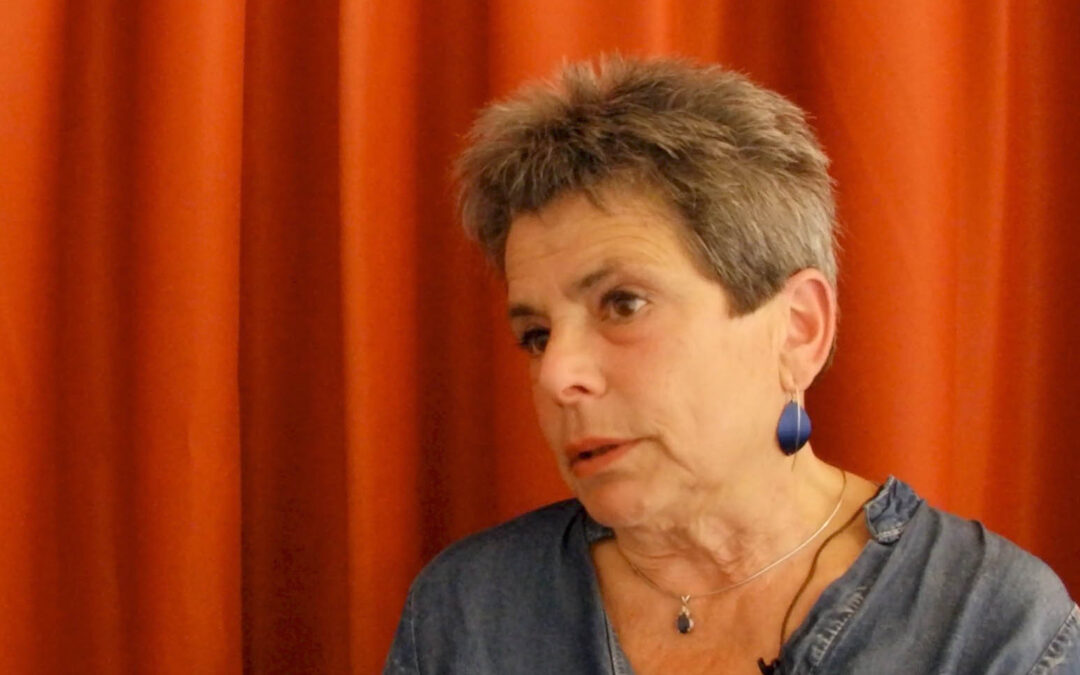
Jul 28, 2017 | Multimedia items, News, Video clips
The ICJ continues its series of profiles of its women Commissioners with an interview with Prof. Jenny E. Goldschmidt, who is currently serving her third term as an ICJ Commissioner.
She was first elected to the Commission in 2003 and re-elected in 2008 and 2013.
She is a Member of the Advisory Board of Nederlands Juristen Comité voor de Mensenrechten (NJCM), and NJCM Public Interest Litigation Group. The NJCM is the ICJ’s National Section in the Netherlands.
In this wide-ranging interview, Jenny describes how she started out her career as a lawyer by studying Constitutional law; how her interests began to focus on the haves and the have nots and from there her interest in human rights developed.
She explains how she has always combined academic research and teaching with practical work, particularly during her years as the President of the Equal Treatment Commission in the Netherlands. She also stresses the importance of working in an inter-disciplinarian manner.
For example, she explained that after academics had developed concepts of direct discrimination, indirect discrimination, and systemic discrimination, these concepts were taken on board by lawyers and have been incorporated into case law.
She gave the example of how the European Court of Human Rights and the European Court of Justice are now incorporating this type of stereotyping into their equality concept.
She emphasized human rights law must protect women and that this protection must be embodied in law.
She considered that it is vital to take cases to the Treaty Bodies and courts everywhere to establish severe measures against discrimination and domestic violence.
But human rights lawyers also need sociologists to help find the arguments that convince people and how we can influence their behavior.
“Sometimes soft law and mediation can be effective and you need other disciplines to show in which cases which instruments are most effective,” she said.
She explained that because women are not a homogenous group and because of migration and all the divisions in society, inter-sectionality has become one of the crucial challenges for women’s rights.
She believes in combining a focus on the general problems which all women face as well as taking into account that some women are even less equal than others – that women who belong to minorities, that women who are disabled, that girls are more vulnerable than the majority of women.
“I think one of the things that the disability convention tries to do by giving a specific provision for women and girls rights is that it forces the authorities, the Treaty Bodies, the national and international institutions to be aware of the fact that we are talking about women and disabled people and that we have to take two perspectives at the same time into account,” she added.
When asked what advice she would give a woman who wants to pursue a career in human rights she said: “Don’t give up! And don’t think it will be easy. Human rights world still is a man’s world.”
Jenny Goldsmith is currently Emeritus Professor of Human Rights Law, and was from 2007-2014 Director of the Netherland Institute of Human Rights at the University of Utrecht.
From 1994-2003 she was President of the Equal Treatment Commission of the Netherlands.
She is on the board of Disability Studies in the Netherlands and involved in several NGOs of disability rights, democracy, and human rights.
Watch the interview:
The series of profiles introducing the work of ICJ Commissioners and Honorary Members on women’s rights was launched on 25 November 2016 to coincide with the International Day to Eliminate Violence against Women and the first day of the 16 Days of Activism Against Gender-Based Violence Campaign.









